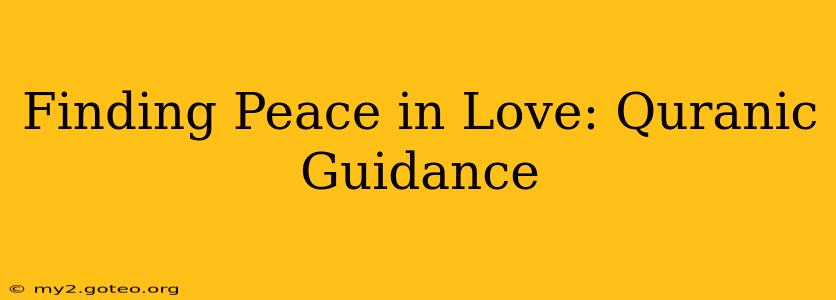Finding lasting peace in love is a universal human aspiration. While romantic love often dominates our cultural narratives, true peace within a loving relationship requires a deeper understanding that transcends fleeting emotions. The Quran, a divine scripture for Muslims, offers profound insights into cultivating harmonious and peaceful relationships, based on mutual respect, understanding, and commitment to God's will. This exploration delves into the Quranic principles that guide us toward finding peace in love.
What are the key Islamic teachings on love and marriage?
Islamic teachings on love and marriage emphasize the sacred nature of the union, viewing it as a means of spiritual growth and fulfilling a divine purpose. Marriage is not merely a social contract but a covenant ordained by God, designed to foster mutual support, compassion, and the raising of a righteous family. The Quran highlights the importance of kindness, compassion, and patience within the marital relationship, emphasizing that these qualities are fundamental to achieving a peaceful and fulfilling life together. It discourages harshness, selfishness, and discord, instead promoting empathy and understanding as the cornerstones of a successful marriage.
How does the Quran define a successful marriage?
The Quran doesn't explicitly define a "successful marriage" with a checklist, but rather provides guiding principles that lead to success. A successful marriage, according to Islamic teachings, is characterized by:
- Mutual Respect and Understanding: Recognizing each other's strengths and weaknesses, forgiving faults, and actively working towards a common understanding. This echoes the Quranic emphasis on treating others with dignity and compassion (4:1).
- Shared Responsibility: Partners share responsibilities within the household and in raising children, ensuring a balanced and equitable partnership (2:228).
- Spiritual Growth: Supporting each other's spiritual journey, engaging in prayer and worship together, and striving for closeness to God as a couple.
- Forgiveness and Reconciliation: Acknowledging mistakes, seeking forgiveness, and striving to resolve conflicts peacefully. The Quran emphasizes the importance of forgiveness and reconciliation in overcoming disagreements (42:37).
- Commitment and Loyalty: Maintaining faithfulness and fidelity, building trust and stability within the relationship.
What are the Quranic verses about love and compassion in marriage?
Several verses in the Quran subtly touch upon the importance of love and compassion in marriage. While not directly stating "love" in the romantic sense, they emphasize qualities that foster loving relationships:
- Kindness and Gentleness (4:19): The Quran encourages spouses to treat each other with kindness and gentleness, reflecting the compassionate nature of God's mercy.
- Companionship and Comfort (30:21): Marriage is presented as a source of comfort and companionship, highlighting the emotional and spiritual support spouses should provide.
- Justice and Fairness (4:129): Treating each other fairly and justly is paramount, ensuring equity and preventing imbalances within the relationship. This requires understanding and empathy.
These verses aren't romantic declarations but rather practical guidelines that create the foundation for a loving and peaceful marriage.
How can couples apply Quranic principles to resolve conflicts?
Conflicts are inevitable in any relationship. The Quran guides couples on how to navigate these disagreements peacefully:
- Dialogue and Communication: Open and honest communication is vital. Expressing feelings constructively, listening empathetically, and seeking common ground are essential.
- Patience and Tolerance: Conflicts require patience and tolerance from both sides. Understanding the other's perspective, even if you don't agree, is key to de-escalating tension.
- Forgiveness and Reconciliation: Holding onto grudges only intensifies conflict. Seeking forgiveness and striving for reconciliation are crucial steps towards healing the relationship. The Quran emphasizes the immense reward in forgiving others (42:40).
- Seeking Mediation: If conflicts persist, seeking advice from respected religious leaders or elders can be beneficial in finding solutions.
What is the role of family and community in a Muslim marriage?
Family and community play a crucial supportive role in a Muslim marriage. The Quran encourages maintaining strong family ties and seeking guidance from trusted elders. The community can provide emotional and practical support, offering a network of shared values and traditions to reinforce the marital bond.
Finding peace in love, within the context of an Islamic marriage, is a journey of continuous growth and mutual understanding. By embracing the Quranic principles of respect, compassion, forgiveness, and commitment, couples can build strong, harmonious, and enduring relationships rooted in faith and love.

